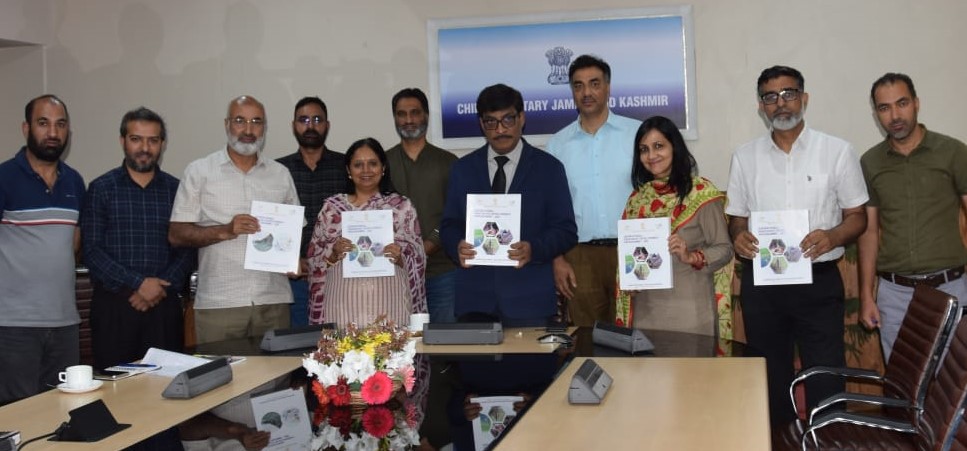Chief Secretary launches ‘Aspirational Panchayat’ dashboard for monitoring rankings of 4291 Panchayats
Asks for development of panchayat websitesto reflect their progress

SRINAGAR, AUGUST 8: Chief Secretary, Dr Arun Kumar Mehta today launched the Planning, Development and Monitoring Department dashboard for monitoring the progress of panchayats of J&K under ‘Aspirational Panchayat Development Programme (APDP)’.
Those who were present included Commissioner Secretary, RDD; Commissioner Secretary, IT; Secretary, PD&MD; DG, Planning; CEO, JaKeGA besides other concerned officers.
During the launch ceremony, the Chief Secretary felicitated the Planning Department for coming up with the monitoring mechanism for keeping track of the development of Panchayats. He observed that tools like these are the sure way of bringing efficiency in the governance and advised the developers to programme other such tools in future.
The Chief Secretary called this dashboard a mirror to find out the areas of concern for each panchayat. He remarked that it would make the interventions more directional with requisite outcomes to be monitored in real time. He exhorted upon all to carry forward this exercise of updating this portal periodically and not to turn such efforts into ritualistic affair only.
Dr Mehta made out that the data available over this dashboard together with the plans of each panchayat available over the ‘Janbhagadari’ portal can be used to develop separate portals for each panchayat. He further added that the statistics relating to population and institutions present there should also be captured to make these portals informative for general public.
The Chief Secretary also enjoined upon the officers to ensure that the ‘Prabhari Officers’ of each panchayat go through the reports about their concerned Panchayats each month in order to have fair idea about the status of development there. He directed for making it one of the benchmarks to assess their performance annually.
Dr Mehta also asked the officers to work in coordination with each other to realize the goal of ‘Zero Poverty’ in J&K by 2024. He asked them to study the panchayat models adopted by the states like Kerala, Telangana, Karnataka, Madhya Pradesh and Uttar Pradesh to adopt best practices implemented there. He directed formulating a plan that is more suitable and realistic for meeting our targets and expectations at large.
On the occasion the Secretary, PD&MD, Raghav Langar informed the participants about the unique features of the dashboard. He made out that each of the Panchayat is evaluated across 9 sectors having 100 indicators. He informed that the dashboard has a feature to filter top and bottom Panchayats in each district across different sectors.
It was also brought out that the data entry for each month has to be done at the Panchayat level which has to be validated at Block and authenticated at District level. It was revealed that for the capacity building of the staff, a training module has been conceived for them to make this exercise efficient.
Aspirational Panchayat Development Programme (APDP) has been conceived on the analogy of“Aspirational Block Development Programme” of UT of J&K. It has been conceived for holistic development of Aspirational Panchayats over a period of time. The process included rating all the 4291 Panchayats spread over 285 Blocks in 20 Districts of Jammu and Kashmir on defined socio-economic indicators.
Pertinently, the 100 measurable indicators (KPIs) across 9 Sectors include Agriculture & allied Activities (6 indicators), Health & Nutrition (11 indicators), Education (13 indicators), Rural Development & Sanitation (7 indicators), Individual Beneficiary Oriented Schemes (4 indicators), Skill Development (4 indicators), Basic Infrastructure (17 indicators), Environment (5 indicators), & Good Governance (33 indicators). These provide insight into existing status and will also capture incremental progress over a period of time. On the basis of importance of these sectors, weights had been assigned to each sector and sub-indicators as per relevance in the life of rural population.






